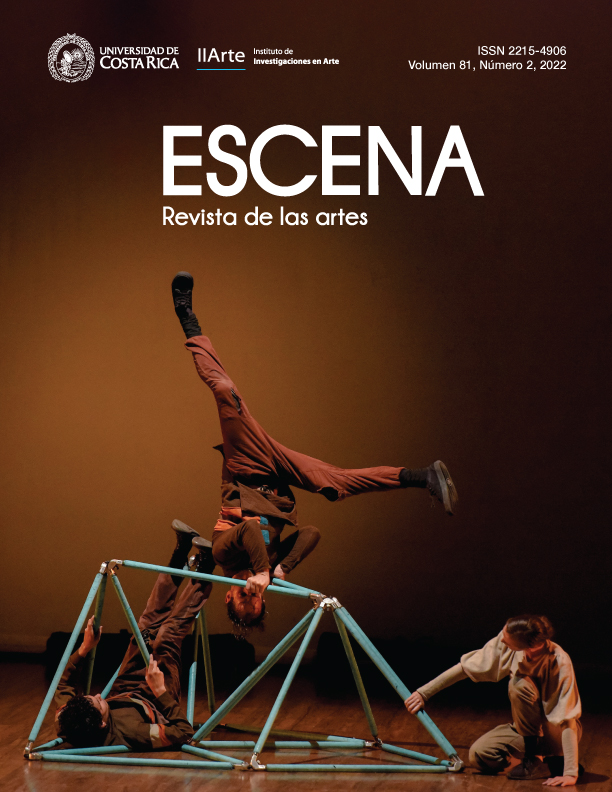Abstract
This article analyzes Martin Rejtman’s film Los guantes mágicos (2003) from the point of view of the intersection between body, technology, biopolitics and a pharmacopornographic regime. To this end, it first reviews these concepts and their approach in philosophy and then examines the way in which corporeality and illness are represented in the aforementioned film. In Los guantes mágicos (2003), illness and bodies are mainly discursive. Sick subjectivities are first said and by being said they become materialized, they become a body. Technology, pharmacological advances, and the logic of the market become, in this way, somatic incorporations.
References
Agamben, G. (1998). Homo Sacer I. El poder soberano y la nuda vida Valencia, España: Pretextos.
Aguilar, G. (2010). Otros mundos. Un ensayo sobre el nuevo cine argentino. Buenos Aires, Argentina: Santiago Arcos.
Bataille, G. (1987). La parte maldita. Precedida de la noción de gasto. Barcelona, España: Icaria.
Bernini, E. (2008). Estudio Crítico sobre Silvia Prieto. Entrevista a Martín Rejtman. Buenos Aires, Argentina: Picnic.
Campero, A. (2014). Nuevo cine argentino. De Rapado a Historias extraordinarias. Los Pol-vorines, Argentina: Universidad Nacional de General Sarmiento.
Deleuze, G. (1992). Postscript on the Societies of Control. October, 59, 3‒7.
Depetris Chauvin, I. (2012). Voice, Music and the Experience of the Neutral in Martín Rejtman’s Fictions. Hispanic Issues On Line, 9, 214‒236.
Drucaroff, E. (2011). Los prisioneros de la torre: política, relatos y jóvenes en la postdictadura. Buenos Aires, Argentina: Emecé.
Foucault, M. (1992). La verdad y las formas jurídicas. Barcelona, España: Gedisa.
Foucault, M. (2014). Historia de la sexualidad 1. La voluntad de saber. Buenos Aires, Argentina: Siglo XXI Editores. (Publicación original de 1976).
Giorgi, G. (2014). Formas comunes. Animalidad, cultura, biopolítica. Buenos Aires, Argentina: Eterna Cadencia.
Giorgi, G. & Rodríguez, F. (2009). Prólogo. En G. Giorgi y F. Rodríguez (Eds.), Ensayos sobre biopolítica. Exceso de vida (pp. 9‒34). Buenos Aires, Argentina: Paidós.
Gordon, R. (2017). Narrativas de la suspensión. Una mirada contemporánea desde la literatura y el cine argentinos. Buenos Aires: Libraria.
Le Breton, D. (2002). Antropología del cuerpo y modernidad. Buenos Aires: Nueva Visión.Nancy, J-L. (2006). El intruso. Buenos Aires, Argentina: Amorrortu.
Preciado, P. (2002). Manifiesto contra-sexual. Madrid: Opera Prima.
Preciado, P. (2014). Testo yonqui: sexo, drogas y biopolítica. Buenos Aires, Argentina: Paidós.
Rubino, A. (2019). El sinsentido como resistencia. Zombies, cyborgs y fantasmas en Litera-tura y otros cuentos de Martín Rejtman. Orbis Tertius. Revista del Centro de Estudios de Teoría y Crítica Literaria, 24(29), e112. DOI: 10.24215/18517811e112
Rejtman, M. (2011). Velcro y yo. Buenos Aires: Mondadori.
Rejtman, M. (2014). Rapado. Silvia Prieto. Los guantes mágicos. Rosario: Beatriz Viterbo.
Sarlo, B. (2003). Plano, repetición: Sobreviviendo en la ciudad nueva. En A. Birgin y J. Trímboli (Eds.), Imágenes de los noventa (pp. 125‒149). Buenos Aires: Libros del Zorzal.
Sibilia, P. (2005). El hombre postorgánico. Cuerpo, subjetividad y tecnologías digitales. Buenos AiresFondo de Cultura Económica.
Sanjurjo, M. (2007). Derivas de la identidad en la filmografía de Martín Rejtman. En M. Moo-re y P. Wolkowicz (Eds), Cines al margen. Nuevos modos de representación en el cine argentino contemporáneo (pp. 137‒150). Buenos Aires: Libraria.
Sloterdijk, P. (2000). Normas para un parque humano. Una respuesta a la Carta sobre el humanismo de Heidegger. Madrid: Siruela.
Sloterdijk, P. (2003). El hombre operable. Notas sobre el estado ético de la tecnología. Revista Laguna, 14, 9‒22.
##plugins.facebook.comentarios##

This work is licensed under a Creative Commons Attribution-NonCommercial-NoDerivatives 4.0 International License.
Copyright (c) 2022 Atilio Raúl Rubino



